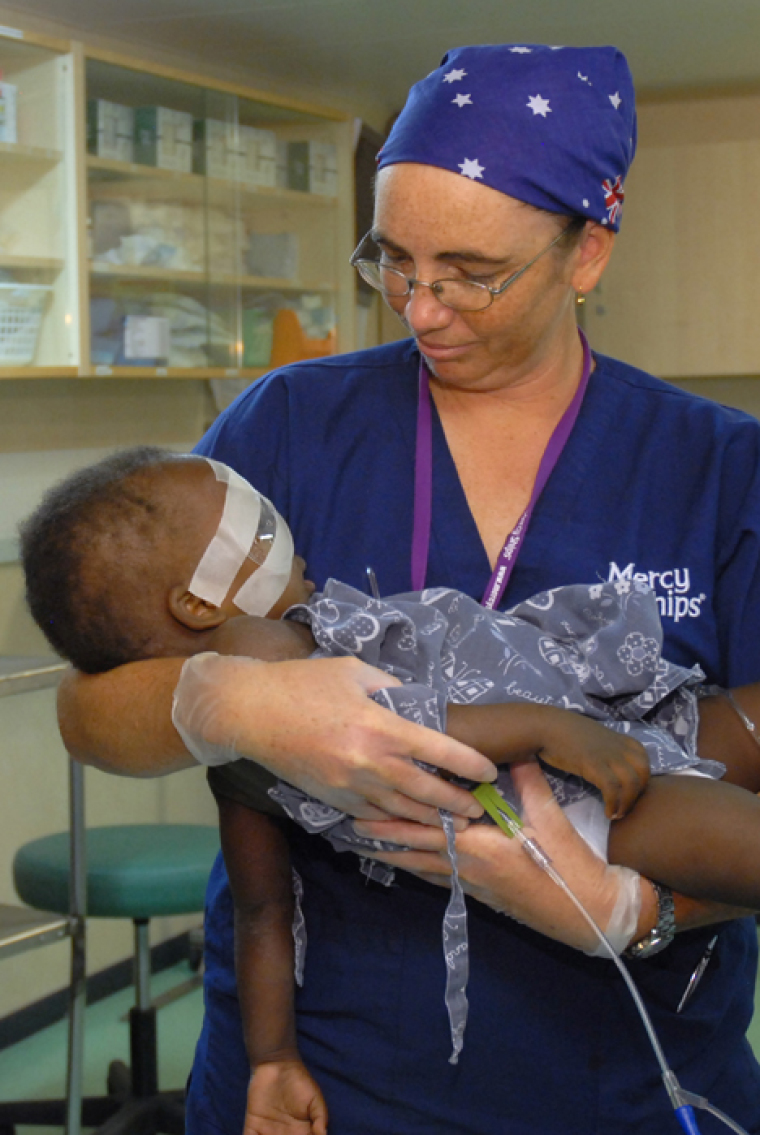
Jenny is back from her third period of service as a volunteer operating theatre nurse on the world's largest charity hospital ship Africa Mercy in Togo, West Africa, one of the world's poorest countries.
She says hearing about the medical problems people face in that part of world, the lack of health care services and the reality that many people simply cannot afford such services, can make you think. "There is no way you can travel to such places as Togo and work with all the amazing people onboard the ship without feeling changed by the end of your time, no matter how many times you have served. The experience challenges everything we consider of value in the developed world."
"One weekend I visited a village where a woman in labour needing a Cesarean Section had to be transported to the hospital on the back of a motorbike because nobody in her village drives a car. In Australia you hear people complain when they have to wait in a hospital emergency room for a few hours."
"Another day a few of us were invited to visit a small village where one of our translators has a farm. The level of need we saw during one day was overwhelming. There was big mango tree in the village. It would be a great food source but the ground needs fertilising and the people can't afford to buy any. There has been little change in farming practices for many generations and the translator, George, hopes to be able to pass on advice from a Mercy Ships agronomist onboard that will help make local farms more productive.
"The village water supply comes from a small river one kilometre away. People collect water from one spot, bathe and swim 10 metres downstream and do their washing a further 10 metres away. George could not tell us how many other villages upstream do the same thing. The village has applied for government funding to have a well dug, but has not had any response. There is a local hospital, staffed by one nurse, two rusty old beds in one room with another four rooms empty, virtually no supplies to run it, a pharmacy stocking virtually only malaria treatments.
"We were told this village has five churches in it, but many of the people who attend still practice voodoo and still hold on to other tribal religious beliefs. George said many people in his village had never heard the gospel."
Jenny, who works at Swan Hill District Hospital, spent more than five months on the hospital ship this time around, The Africa Mercy has six operating theatres, a 78-bed hospital, state-of-the art equipment and a crew of more than 450 volunteers from around the world. While life changing surgeries are provided onboard without charge to correct deformity, disability and deformity, other volunteers work in the community on a wide range of health and community development programs as well as training local people in skills that can be passed on to others.
"Working with Mercy Ships provided daily reminders that without God we can do nothing. There are times when medicine can do so much, and God needs to do the rest. We often forget that in our world. It was such an amazing experience again, being in Africa and seeing people from so many nations all working together for the poorest people in our world. Each time I have served as a volunteer I have felt that I have benefitted as much as those we are there to help. The best thing about such an experience is seeing the lives of people transformed. Helping an old woman to see again, giving a child back to its mother after repairing a cleft lip. These are the experiences that keep others and me going back," Jenny concludes.
Mercy Ships is a global charity that has operated hospital ships in developing nations since 1978 providing free health care and community development services to the forgotten poor. Following the example of Jesus, Mercy Ships brings hope and healing to the poor. Working in partnership with local people, Mercy Ships empowers communities to help themselves. The result is a way out of poverty.
The emphasis is on the needs of the world's poorest nations in West Africa, where the Africa Mercy provides the platform for services extending up to ten months at a time. Mercy Ships works on land-based projects in Sierra Leone in partnership with other organisations, while teams also work in several nations of Central America and the Caribbean. Mercy Ships Australia, one of 14 international support offices is based on the Queensland Sunshine Coast.
On the web: www.mercyships.org.au